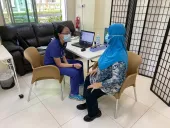
‘Analytics and AI save lives’: says InterSystems APAC head
Data platforms are key to continued healthcare transformation after the pandemic.
COVID-19 has challenged the entire healthcare industry and that includes enormous data challenges. The rate of data growth in healthcare was already higher than almost every other industry but, with underinvestment in technology, data was not always put to the best use.
The pandemic has changed all that, according to Luciano Brustia, Asia Pacific regional managing director at InterSystems. There has been an urgent need to make better use of health data, whether for testing and tracing, diagnosis, the management of patients, or more efficient operations.
“In healthcare, analytics has been difficult because of the complexity of the data and because it is siloed in different systems,” said Brustia. “With COVID-19, we’ve seen huge demand for interoperability to make health data more useful and easier to analyse. There’s also growing awareness of the value of healthcare data platforms.”
InterSystems worked closely with customers to respond to the pandemic, he said. “Labs needed to integrate new PCR testing machines with their laboratory and EMR systems. Hospitals needed to implement COVID screening and dashboards within their EMRs. Health regions needed to create COVID alerting systems. We’ve also helped integrate artificial intelligence (AI) systems to diagnose COVID cases.”
The pandemic has certainly accelerated the digital transformation of the sector. Governments and healthcare providers have seen the power of information in responding to COVID-19. With increased stress on healthcare systems, digital transformation can no longer afford to be a multi-year strategy.
“With interoperability, healthcare organisations can be more adaptable, flexible, and agile right now,” said Brustia. “We have a government customer in Australia that needed to rapidly integrate their infectious diseases notification system with a new contact tracing system. With our healthcare data platform, they did that in a few weeks.”
The question is, after COVID-19 has faded into the background, will this rapid transformation be sustained, so healthcare organisations can be more agile and responsive to the needs of the communities they serve?
“There is definitely a willingness to invest in healthcare data platforms to enable longer-term transformation and innovation,” said Brustia.
It is a lot easier and more sustainable to provide data management, interoperability, analytics, and scalability in a single platform, he explained.
“South West Alliance of Rural Health and Barwon Health in Australia, for example, are using our data platform to unify all their clinical and administrative data with interoperability across multiple public hospitals and health services. They are looking to implement analytics, AI and machine learning to leverage all the data they have and adopt innovative solutions.”
But if you are a healthcare provider that hasn’t fully digitised yet, where do you start your transformation journey?
“We have a private hospital customer that started transformation before they had fully digitised,” said Brustia. “It wasn’t long before they realised that, to take advantage of analytics and AI across the organisation, they needed to capture their clinical and operational data in an electronic medical record system.
If an EMR is the first step, then a healthcare data platform is the next step in a transformation journey, Brustia added. As part of a suite of interoperability tools, they will need an FHIR repository to take advantage of innovative solutions. They will need to ensure their data is “clean” and flows seamlessly between systems; they will need to scale up their solutions as healthcare data volumes and transactions grow exponentially.
Many of these challenges come together in the development of AI diagnostic and precision medicine solutions that use machine learning to train algorithms. That is just one important use-case for a data platform approach, said Brustia.
“Our data platforms enable medtech and healthtech companies, for example, to acquire data from healthcare providers, laboratories, medical devices and other sources to enhance their products and solutions with analytics and AI.”
Perhaps the most important role of a data platform is to ensure that health data is fit for providing the best quality care.
“You have probably heard of the expression, ‘garbage in, garbage out’. That is not acceptable when you are dealing with people’s lives. Data cleansing and consistency, something we call ‘Healthy Data’, is very important for analytics and AI,” said Brustia.
“At the end of the day, that is a capability that healthcare providers, medtech companies, and healthtech companies all need to have.”
To find out more about leveraging AI in healthcare, download the AI in Healthcare: Early Stage With Steady March To Maturity report for free.













 Advertise
Advertise













